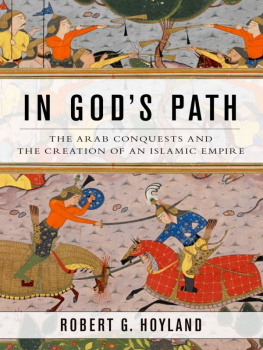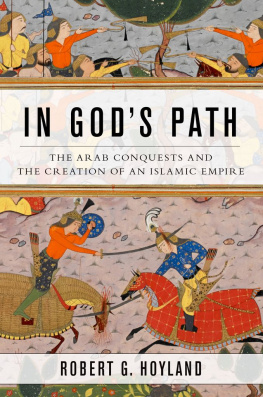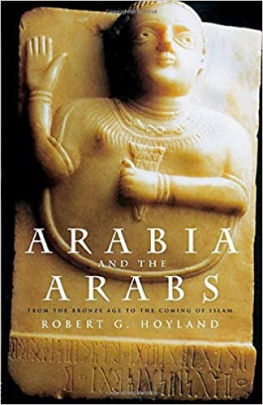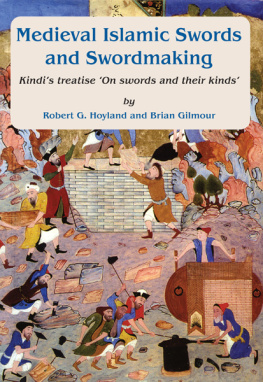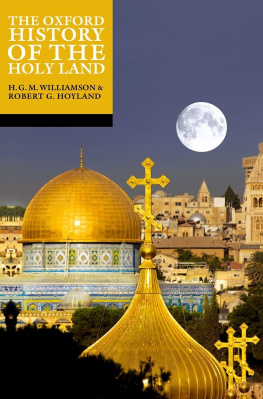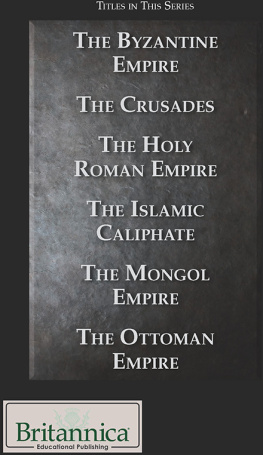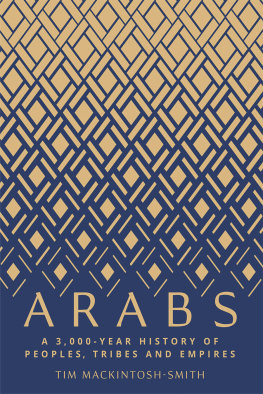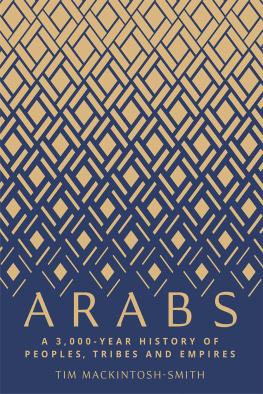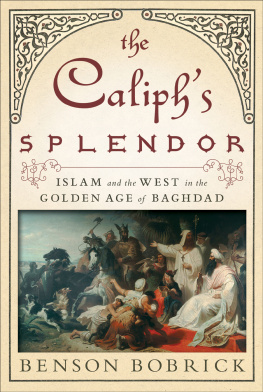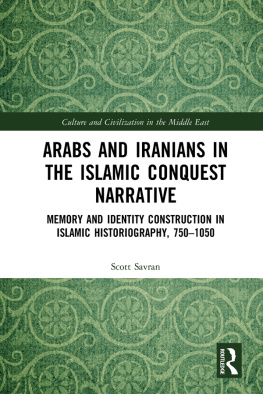In God's Path:
The Arab Conquests and the Creation of an Islamic Empire
Robert G. Hoyland
Oxford University Press
London
Copyright 2021 by Robert G. Hoyland
All rights reserved. No part of this book may be used or reproduced by any means, graphic, electronic, or mechanical, including photocopying, recording, taping or by any information storage retrieval system without the written permission of the publisher except in the case of brief quotations embodied in critical articles and reviews.
The views expressed in this work are solely those of the author and do not necessarily reflect the views of the publisher, and the publisher hereby disclaims any responsibility for them.
Oxford University Press books may be ordered through booksellers or by contacting:
Oxford University Press
London
www.global.oup.com
1-800-Authors (1-800-128-3477)
Because of the dynamic nature of the Internet, any Web addresses or links contained in this book may have changed since publication and may no longer be valid. The views expressed in this work are solely those of the author and do not necessarily reflect the views of the publisher, and the publisher hereby disclaims any responsibility for them.
ISBN: 0199916365 (sc)
ISBN: 9780199916368 (dj)
ISBN: 0199916365 (ebook)
Library of Congress Control Number: 0199916365
Oxford University Press; Revised, Updated Edition (15 March 2021)
Contents
one must go on Jihad at least once a year One may use a catapult against them when they are in a fortress, even if among them are women and children. One may set fire on them and/or drown them. [Imam al-Ghazzali, the second greatest scholar of Islam after Muhammad]
In the Muslim community, the holy war is a religious duty, because of the universalism of the (Muslim) mission and (the obligation to) convert everybody to Islam either by persuasion or by force. [Ibn Khaldun, The Muqaddimah, New York, p. 473]
The tragic 9/11 attacks in the United States have dramatically changed the worlda change, which will persist for a long time to come. Indiscriminate violence worldwide by al-Qaeda and like-minded Muslim groups in the name of Jihad or Islamic holy war against the infidels (non-Muslims) has plunged both the Islamic and non-Islamic world into a crisis of security and stability. There is also an ascending tide of puritanical Islamic revivalism among the wider Muslim populace globally. Both these trends pose an unprecedented threat to future security of the secular-democratic nations, both in the West and elsewhere. The violent Jihadi groupsaiming to establish puritanical Islamic rule globally, governed by the Islamic holy law (Sharia)seek to destroy the modernist, secular-democratic and progressive world-order through indiscriminate violence, death, and destruction. The nonviolent puritanical Islamic revivalism, which has a wider appeal amongst Muslims, seeks to achieve the same goal, albeit through different means: through ever-growing demand for the legislation of Sharia and for the gradual suppression of practices and social behaviours in Western societiesfreedom of speech, mixing of opposite sexes, and homosexuality etc.deemed offensive to Islam.
A poll in 2006 found some 40 percent of British Muslims wanted to be governed by Sharia laws, while some 60 percent of them wanted to see Sharia courts operate for the mediation of Muslim affairs. A recent study by the Center for Social Cohesion in the U.K. found some 4 percent of Muslim students in British Universities support killing to promote and preserve Islam; 32 percent thought that killing was justified in the defence of Islam; 40 percent support the introduction of Sharia law for Muslims in Britain and 37 percent oppose it. Some 33 percent support the creation of a worldwide Muslim caliphate, with only 25 percent opposed to the idea. The study also found that extremism is on the rise amongst Muslims and young Muslims are religiously more radical than their parents generation. Although Muslims currently constitute only about 3.5 percent of the British population, many aspects of Sharia law are unofficially practised widely in the Muslim community.
Under these circumstances, Rowan Williams, the Archbishop of Canterbury, said in February 2008 that the introduction of Sharia law in the U.K. was unavoidable and urged the government to consider its legal introduction. This is a step toward establishing Sharia laws in the U.K.
The Islamic Jihad or holy war stands for Fighting in the Cause of Allah , which Allah has introduced into the Islamic doctrine through a long list of verses in the Quran, such as verse 2:190.
As to the relationship between Muslims and infidels, this is summarized by the Most Highs (Gods) Word: We renounce you. Enmity and hate shall forever reign between ustill you believe in Allah alone. So there is an enmity, evidenced by fierce hostility from the heart. And this fierce hostilitythat is, battleceases only if the infidel submits to the authority of Islam, or if his blood is forbidden from being shed, or if Muslims are at that point in time weak and incapable. But if the hate at any time extinguishes from the heart, this is great apostasy! Allah Almightys Word to his Prophet recounts in summation the true relationship: O Prophet! Wage war against the infidels and hypocrites and be ruthless. Their abode is hellan evil fate! Such, then, is the basis and foundation of the relationship between the infidel and the Muslim. Battle, animosity, and hatreddirected from the Muslim to the infidelare the foundation of our religion. And we consider this a justice and kindness to them.
Others have disputed this Muslim-to-infidel unidirectional and unrestrained hostility as the theological foundation of Jihad. Many moderate Muslims and scholars of Islam argue that the acts of indiscriminate violence, as perpetrated by al-Qaeda and like-minded Islamist groups, must not be called Jihad. Jihad, they claim, stands for a peaceful spiritual struggle, totally disconnected from violence. Like President Bush, they argue that Islam is a religion of peace and that violence has no place in it. It is also widely claimed, including by many non-Muslim scholars of Islam, that the hallmarks of Islamic history were those of tolerance, peace, and equality, which Christianity failed to offer to its Muslim (e.g., in Spain) and other non-Christian subjects (e.g., the Pagans and Jews in Europe and Americas).
Speakers at a Counter Terrorism Conference (February 1921, 2008), organized by the East West Institute at Brussels, repeatedly argued that the term Jihad must be dissociated from violence of al-Qaeda because, for most Muslims, Jihad originally means a spiritual struggle and they dont want it hijacked anymore. Iraqi scholar Sheikh Mohammed Ali told the conference that Jihad is the struggle against all evil things in your soul There is no jihadi terrorism in Islam. Emphasizing that Jihad can be a struggle for elimination of poverty , for education or for something very, very positive in life , General Ehsan Ul Haq, the former chairman of Pakistans joint chiefs of staff, asserted that calling the terrorists Jihadists is either reflective of a lack of understanding of Islam or unfortunately an intended misuse.
Since the 9/11 attacks, orchestrated by al-Qaeda in the name of Jihad, Muslims as well as many non-Muslim scholars and academics, have come out in force to defend this nonviolent notion of Jihad. Daniel Pipes has quoted several examples of the positive portrayals of the meaning of Jihad, which are summarized below.
Zayed Yasin, president of the Harvard Islamic Society, in a speech, entitled My American Jihad , at the Universitys 2002 commencement ceremony, said, Jihad, in its truest and purest form, the form to which all Muslims aspire, is the determination to do right, to do justice even against your own interest. It is an individual struggle for personal moral behavior Harvard dean Michael Shinagel, probably with no knowledge of Islamic theology, gave an emphatic endorsement of Yasins definition of Jihad as a personal struggle for promoting justice and understanding in ourselves and society. Professor David Mitten, advisor to the Harvard Islamic Society, defined true Jihad as the constant struggle of Muslims to conquer their inner base instincts, to follow the path to God, and to do good in society.

